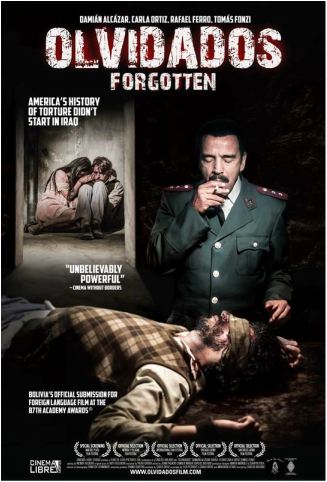 Film chronicles the horrors perpetrated under “Operation Condor.” Film chronicles the horrors perpetrated under “Operation Condor.”
Tags: crime/law/deviance, government/the state, historical sociology, violence, war/military, authority, human rights, imprisonment, state terror, torture, 61+ mins
Year: 2015 Length: 72:00 Access: no online access (trailer here) Summary: The film Olvidados explores the horrors perpetrated under “Operation Condor,” which was responsible for: 50,000 deaths; 30,000 “disappeared”; and 400,000 arrested and imprisoned in Argentina, Bolivia, Brazil, Chile, Paraguay, and Uruguay. In the 1970’s, Operation Condor was a US-backed program to install right wing dictators in Latin America to eliminate the threat of communism. To accomplish this, the CIA provided training and support to the militaries of Argentina, Chile, Bolivia, Paraguay, and Uruguay, which led to the disappearance of tens of thousands of citizens all of whom suffered from some of the worst violations of human rights in modern history. In the film, an aged Bolivian General, José (Damián Alcázar, El Narco), looks for redemption after suffering from a heart attack by confessing truth to his only son about his role in the persecution of countless men and women. Among the people who were “disappeared” are a journalist (Carlotto Cotta), a dancer (Ana Calentano), an activist (Tomás Fonzi), and a pregnant woman (Carla Ortiz) – all of whom were brutalized at the hands of José and other military leaders, which produced a cascade of lies and betrayal across generations. The historical events chronicled in the film would be useful to help teach numerous sociological topics, including concepts related to the state, authority, military, torture, imprisonment, human rights, and social justice. It could also be a useful resource for a travel learning course that focuses on any of these South American countries. Submitted By: Cinema Libre Studio
6 Comments
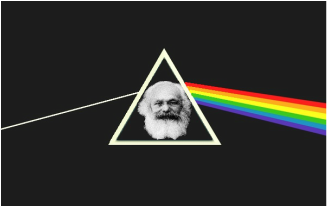 Pink Floyd is useful for teaching sociological theory Pink Floyd is useful for teaching sociological theory
Tags: class, education, foucault, government/the state, inequality, knowledge, marx/marxism, theory, alienation, althusser, gramsci, hegemony, state apparatuses, subtitles/CC, 00 to 05 mins
Year: 1982 Length: 5:13 Access: YouTube Summary: In my Classic Sociological Theory class, I ask students to write a reflective essay on Marxist concepts of alienation (see also here, here, here, here, and here) and class conflict, and then I ask them to relate the concepts to Pink Floyd's "Another Brick in the Wall." It is a common misunderstanding that Marx was solely a materialist who ignored the sphere of ideas. On the contrary, Marx explicitly argued that "the ideas of the rulling class were in every epoch the ruling ideas." To stretch students’ analytical skills I ask and encourage them to also incorporate Althusser’s idea of state apparatuses (repressive and ideological). That is, drawing from the video, what does it mean to say that the state is repressive in order to further the interests of the ruling classes? I then ask students to push their argument even further and incorporate a discussion of Gramsci’s notion of hegemony (see also here, here, and here). Here the question is, how does the bourgeoisie develop a hegemonic culture, wherein its own values and norms become common sense for all? Instructors should feel free to press for a more radical departure from Marx. For instance, it might be fruitful to draw on Foucault to analyze resistance, punishment, and the complex notion of power-knowledge. I remind students that the objective is not to merely summarize the theories and create links between concepts and the video, but to use the video as a springboard for a deeper discussion about resistance and oppression. Submitted by: Hadi Khoshneviss, University of South Florida 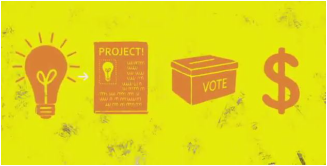 These steps for participatory budgeting can improve democracy. These steps for participatory budgeting can improve democracy.
Tags: government/the state, politics/elections/voting, budgeting, democracy, real utopia, 00 to 05 mins
Year: 2013 Length: 3:02 Access: YouTube Summary: This video from the Participatory Budgeting Project provides an overview of participatory budgeting (PB). In short, it is a "a different way to engage with government and decide how tax dollars are spent" by engaging all citizens in the budgeting process. The video outlines the steps of participatory budgeting, including (1) brainstorming ideas for projects that citizens would like to see in their neighborhoods; (2) having volunteers develop project proposals and narrow down the proposals; (3), presenting projects to the public for a vote; and (4) funding the projects with the most votes. The projects are then implemented and the process starts again the next year and budgeting cycle. The video draws upon testimonies from people who participate in the New York City PB process (the largest PB system in the US), noting the project's success. It further adds that the process started in Porto Alegre, Brazil in 1989 and has spread throughout 1,500+ communities around the world. Porto Alegre is the most famous example, and has been studied widely. For example, it is featured in Erik Olin Wright's Real Utopias project (see chapter 6, pages 155-167). Wright describes the project and its impacts on Porto Alegre, including a shift toward greater spending on poor communities, high and sustained levels of participation, strengthening of civil society, the near elimination of corruption, and greater tax compliance. Submitted By: Paul Dean  Image by Will Varner Image by Will Varner Tags: corporations, crime/law/deviance, foucault, goffman, government/the state, science/technology, theory, back stage, edward snowden, glenn greenwald, mass surveillance, n.s.a., panopticon, surveillance state, 00 to 05 mins, 11 to 20 mins, 21 to 60 mins Year: clip 1: 2013 | clip 2: 2014 Length: clip 1: 20:41 | clip 2: 5:38 Access: YouTube: clip 1: TED Talks clip 2: New York Times Summary: Taken together, the above two clips make three distinct points about why we should all take the unfolding revelations about N.S.A. surveillance very seriously, and the clips can be used to kick off a sociologically-informed discussion about the surveillance state and it's practice of mass surveillance. 1) In the first clip, journalist Glenn Greenwald delivers a TED Talk where he argues against the claim that only criminals have something to hide. People should take the N.S.A. revelations seriously because everyone has something to hide, even those of us who believe ourselves to be innocent of all crimes. After all, people routinely lock their bathroom doors and use passwords to access their email. To borrow a page from sociologist Erving Goffman, people all have a back stage. 2) In the second clip, journalist David Sirota argues we should take state surveillance seriously because the fact is, we are all criminals. That is, there are so many statutes on the books that virtually anyone could be found guilty of a crime. Chances are that even those who loudly profess they have nothing to hide have unknowingly committed crimes, and as the amount of data being collected and saved increases, the state stores aways more and more opportunities to charge any given citizen of a crime should it prove politically expedient to do so. 3) Finally, Greenwald alludes to a long standing observation in sociology that surveillance changes people; it controls them, even if charges of a crime never materialize and no formal interaction with the criminal justice system occurs. People drastically, if unknowingly, alter their behavior when they suspect they are being watched. No where is this reality more vividly illustrated than in what philosopher Jeremy Bentham described as a panopticon, a prison tower that offers a vantage point from which a guard can see all prisoners in their cells, but does not offer any single prisoner the ability to know whether he or she is being observed. Bentham imagined it as a means of controlling prisoners, but subsequent thinkers—namely Michel Foucault—have used the idea of a panopticon as a metaphor to describe the distinct way in which modern states exercise power and control. The prison tower is now the speed camera inconspicuously perched atop a traffic light; it's also the tablet that tracks it's user's browsing history. This architecture, which claims to exist for the purpose of reducing criminal behavior, is already also changing non-criminal behavior as well. Consider the journalistic practice of offering sources anonymity. As the surveillance state becomes ever more bold, the ability to promise such anonymity slips away, and some would argue, so too does an important check on government power (Note: The Sociological Cinema has explored the topic of the surveillance state here, here, and here, and we maintain a Pinterest board on the topic). Submitted By: Lester Andrist 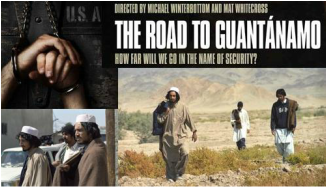 This docu-drama illustrates human rights abuses in the war on terror This docu-drama illustrates human rights abuses in the war on terror Tags: crime/law/deviance, government/the state, prejudice/discrimination, race/ethnicity, religion, war/military, human rights, muslim, racism, rendition, war on terror, 61+ mins Year: 2006 Length: 1:29:43 Access: YouTube Summary: The Road to Guantánamo is an "award-winning, intense, political, docu-drama about the Tipton Three, a trio of British Muslims who were held in Guantanamo Bay for two years until they were released without charge." Just days after 9/11, the three men traveled to Pakistan to attend a wedding. They crossed the border into Afghanistan at the same time that the US began military operations there, and after a series of missteps, they were left stranded. They were captured and transferred to the US military, who had mistaken them for Taliban fighters, and sent them to Guantanamo Bay Naval Base. The Tipton Three were exposed to harsh interrogation techniques but never charged, and eventually were released in 2004. A compelling feature in the film is the combination of first person narratives by the three you men, Ruhal Ahmed, Asif Iqbal and Shafiq Rasul, who appear as themselves in a talking head format alongside dramatic reconstructions of their actual experiences. For example, the film conveys a sense of what it feels like to experience noise bombardment and the 'futility torture' techniques where music is played (e.g. Metallica, James Taylor) to prisoners at deafening volumes in dark rooms. The video can be usefully paired with an article by Suzanne Cusick (2008), “'You are in a Place that is out of this World ...": Music in the Detention Camps of the 'Global War on Terror.'" For a similar account of torture techniques used in the US war on terror at Guantanamo Bay, see this news clip featuring an interview with Muhammad Saad Iqbal Madni. Submitted By: Les Back 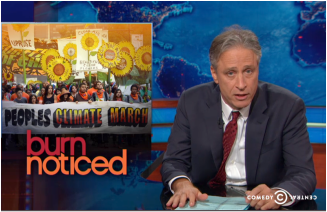 Political agendas enter into scientific discourse. Political agendas enter into scientific discourse. Tags: corporations, environment, government/the state, politics/election/voting, science/technology, campaign financing, climate change, global warming, house of representatives, political bias, 06 to 10 mins Year: 2014 Length: 10:25 Access: The Daily Show Summary: This segment from The Daily Show spotlights a recent hearing of the U.S. House Committee on Science, Space, and Technology, in which President Obama's plan to decrease carbon emissions by 30% by 2030 was discussed. The video would be useful for explaining political bias, the relationship between wealth and power, and the power of corporations in elections. The clip includes footage from the hearing, in which several politicians interrogate Presidential Science Advisor John Holdren about whether climate change is a reality, despite the fact that, by now, the scientific literature has overwhelmingly shown that climate change is a massive global threat for humanity. In this video, U.S. Representatives Steve Stockman (R-Texas) and Larry Bucshon (Indiana-R) refute global warming, despite their inability to provide viable evidence. Indeed, Congressman Bucshon argues that people should trust public comments rather than scientific literature because, in his opinion, “The climatologists...depend on the climate changing to keep themselves publishing articles." He concludes that, "I could read that, but I don’t believe it.” At the end of the clip, Jon Stewart points to Stockman's interest in denying climate change, revealing that his three major campaign donors are big energy companies. This video would work well in combination with another clip on The Sociological Cinema, which illustrates how, despite overwhelming scientific evidence, powerful interests are able to suppress knowledge by introducing doubt into public discourse. Submitted By: Nihal Çelik 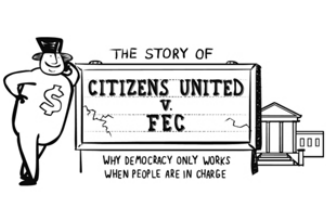 Citizens United v. FEC's impact on US democracy Citizens United v. FEC's impact on US democracy Tags: capitalism, corporations, crime/law/deviance, government/the state, politics/election/voting, campaign financing, citizens united v. federal election commission, democracy, power elite, supreme court, 06 to 10 mins Year: 2014 Length: 8:50 Access: YouTube Summary: This short video created by The Story of Stuff Project explores the relationship between wealth and political power, and examines whether we can speak of democratic elections in the United States. As the video points out, Americans have lost power in their democracy because of modern corporations' single-minded focus on maximizing profits, which have rapidly grown. Although the government can, and should, intervene by setting ground rules to protect society and keep things safe and fair, the reality of the current situation is that corporations, rather than people, write the rules. With Citizens United v. Federal Election Commission (FEC) in 2010, the Supreme Court decided that it is unconstitutional to put any limit on corporations’ financial contribution to elections because it violates free speech (this also invalidated part of the McCain-Feingold Campaign Finance Reform Law). As a result of this decision, corporations can now spend unlimited sums to help elect or defeat political candidates, which makes campaign financing undemocratic. The total cost of elections (congregational and presidential) almost doubled after Citizens United v. FEC, growing from $3.6 billion in 2010 to $6.2 billion in 2012. As the video highlights, the First Amendment was written to protect real people, not corporations. How can people be in charge of democracy again? First, there is a need for a constitutional change, which would overturn the Supreme Court's decision by establishing that corporations do not have the same First Amendment rights as people. Second, in order to eliminate the power of corporations in manipulating the elections, public financing of campaigns needs to be regulated, not liberated. Finally, given that 85% of Americans feel that corporations have too much power and individuals have too little, people should speak up and take social action by fighting for the things people (and not corporations) care about, such as renewable energy, green jobs, health care, safe products, and good-quality education. Submitted By: Nihal Çelik 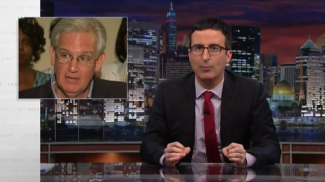 Social and historical forces shaped the Ferguson tragedy. Social and historical forces shaped the Ferguson tragedy. Tags: crime/law/deviance, government/the state, prejudice/discrimination, race/ethnicity, violence, war/military, militarization of police, racial profiling, 11 to 20 mins Year: 2014 Length: 15:09 Access: YouTube Summary: In honor of the first week(s) of class and in response to the tragedy in Ferguson, MO, I began class by discussing "common-sense" explanations for social phenomena (naturalistic or individualistic explanations) versus sociological ones. I typically frame this activity around sociological questions such as: "Why are people poor?" or "Why do more women stay at home with children?" or "Why are people overweight?" I then present individualistic or naturalistic explanations that might be used to explain these phenomena. For instance, in the "why are people poor?" scenario, an individualistic explanation might argue that people are poor because they are are lazy, dumb, or have no skills. A sociological perspective might interrogate structures of opportunity such as education and wealth that can be used for a down payment and to help someone save money. After a couple of these scenarios, I asked students to explore the Michael Brown shooting in terms of these two approaches in order to develop their sociological imaginations. After the discussion, as a class we watched this John Oliver clip that highlights many of the systemic problems in Ferguson, MO specifically, and the U.S. generally, in order to understand the importance of context and historical forces. The clip includes discussions of the prison industrial complex, the militarization of the police force, legacies of housing discrimination, racial profiling, and much more. [Note: This post originally appeared on My Sociological Activation.] Submitted By: Michelle Smirnova 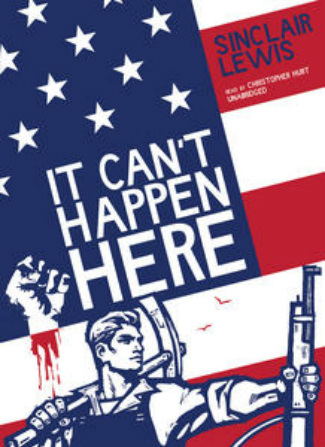 Film explores whether the US is immune to tyrannical rule. Film explores whether the US is immune to tyrannical rule. Tags: crime/law/deviance, government/the state, historical sociology, inequality, nationalism, politics/election/voting, dictatorship, domination, oligarchy, social construction of reality, tyranny, 61+ mins Year: 2013 Length: 94:23 Access: Top Documentary Films Summary: As stated on the film's website: "There are many perfect examples in our recent history which undoubtedly show that dictatorial regimes impose subjection, blackmail, servitude, intimidation, abuse, persecution and execution upon innocent people. However, many Americans are strongly convinced and assuredly assert that such a thing could never happen in the United States. But is this just desirous reasoning? Or, is there something essentially disparate about the United States that makes it resistant to the despotic abuse that has afflicted every other considerable empire in history? The primary step in scrutinizing the assertion that it can't happen here is to recognize and describe what "IT" is. Many people have distorted, almost comic-book-type, impression of dictatorship. In the real world autocracy has always crept in under the pretense of safeguarding the nation, defending the people, and establishing law and order. A dictator, in order to acquire and hold power, must demand the support of the people. An effective oppressor cannot publicly display malevolence and desire for power but must design his approach so as to persuade the people that his goals are righteous, that he wants honesty and fairness to abound, and that the most desirable way to make that true is to give him or her dominance and authority. Tyrannical governments develop by abusing people's fears - economic uncertainty, crime, foreign aggressors and so on and persuading the people that the quick-fix is for a political leader to be legally given absolute jurisdiction so he can shield the people from the wickedness of the world. This is always the pattern out of which autocracy is born. No matter how cruel or bloodthirsty regime becomes those in charge will persist to claim noble intentions and will dictate that an extreme government powers are required to protect the people and to create justice and order. Every time mankind has taken a step away from democracy and towards autocracy it was done in the name of defending the country and the people." Submitted By: Tom Sparhawk 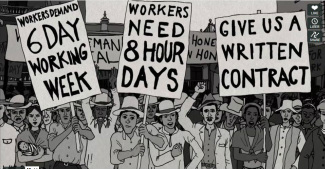 Columbian banana workers demand basic labor rights. Columbian banana workers demand basic labor rights. Tags: capitalism, class, economic sociology, government/the state, historical sociology, inequality, organizations/occupations/work, political economy, social mvmts/social change/resistance, theory, violence, war/military, ideology, labor, neocolonialism, postcolonialism, postcolonial theory, propaganda, 00 to 05 mins Year: 2013 Length: 2:43 Access: Vimeo Summary: This animated excerpt comes from the documentary, "Banana Land: Blood, Bullets and Poison." The clip recounts the events of December 6, 1928, when Colombian workers gathered to the protest the conditions of their employment under the United Fruit Company (UFC), which is now known as Chiquita. As the film explains, by the early twentieth century UFC had become a powerful multinational corporation, and in exchange for its role in helping to prop up repressive regimes in Latin America, the company was afforded cheap land, and in time, it came to develop a monopoly on the transport of fruit in the region. When workers organized to demand better working conditions, including 6-day work weeks, 8-hour work days, money instead of scrip, and written contracts, they were met with a violent response from the Colombian military. Protecting the interests of American economic elites, the United States government threatened to invade Colombia in order to quell the UFC worker protests, and in response, the Colombian government dispatched a regiment from its own army to do the job. The Colombian troops effectively created a kill box, setting their machine guns on the roofs surrounding the plaza where a group of protestors had gathered. After a five-minute warning to disperse, the troops opened fire killing women, men, and children. Other than a sobering reminder of the power corporations often wield over the lives of workers, especially when they have the backing of states, this clip would work well as a means of introducing some of the basic components of postcolonial theory, which can be understood as a body of thought that critiques and aims to transcend the structures supportive of Western colonialism and its legacies. In contrast to Marxist dependency theories and the world systems perspective, work in the postcolonial tradition tends to emphasize cultural, ideological, and even psychological structures born from the forceful and global expansions and occupations of Western empires (Go 2012). The banana strike and its violent conclusion is a vivid example of the way the United States has maintained a postcolonial grip on the running of foreign economies. In this case, a propaganda machine chipped away at international sympathy for the protesting workers, while at the same time, the U.S. was able to wield power over the Colombian government by mere threat of military force. Submitted By: Lester Andrist |
Tags
All
.
Got any videos?
Are you finding useful videos for your classes? Do you have good videos you use in your own classes? Please consider submitting your videos here and helping us build our database!
|
 RSS Feed
RSS Feed
